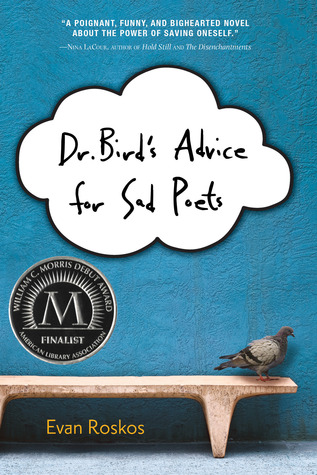
Dr. Bird's Advice for Sad Poets
By Evan Roskos
By Evan Roskos
Published 2013 by Houghton Mifflin Harcourt
James
is struggling with depression. He is also struggling to understand why
his older sister, Jorie, was kicked out of their house. His abusive
father obviously had something to do with it, but there must have been
something that made this time the last time. In the meantime, James will
just have to talk to Dr. Bird - his pigeon therapist - to get some
perspective.
I had heard buzz about this one last year and was
definitely interested but probably wouldn't have picked it up for quite
some time if it hadn't made the Morris Award shortlist. It was one of
the last books I read this year before kicking my "no library books"
resolution into high gear.
I guess I expected more from this book. It wasn't bad, but it also wasn't quite as amazing as I'd expected. What I liked best was the character of James and the humor that Roskos uses throughout the book. A teen dealing with depression is not an easy thing to read about, but Roskos uses the right amount of humor to make the story easier to get through. He never uses the humor to undermine the seriousness of James' depression, however; it's a delicate balance, and I think Roskos pretty well nails it. James is a great character, one that I think many teens will easily relate to. He deals with some pretty typical teenage stuff - parties, school problems, girls - while also dealing with some slightly more atypical stuff - parents (whom he has named "The Brute" and "The Banshee") not worth much, his sister's exile, his own inner turmoil.
What I'm less sold on is the conclusion. On the one hand, I appreciate that Roskos shows that sometimes, it's not any big thing that is the final straw - a lesson I think many teens would do well to learn. But it's also frustrating in the sense that there is a lot of buildup in the book that suggests James is going to uncover something truly awful and epic in the end. And he doesn't. It's a bit of a disappointment, but I also understand why Roskos did it.
So, actually, I think I liked this book a bit more than I
initially believed. Funny how writing your thoughts out can change your
mind a bit.
I guess I expected more from this book. It wasn't bad, but it also wasn't quite as amazing as I'd expected. What I liked best was the character of James and the humor that Roskos uses throughout the book. A teen dealing with depression is not an easy thing to read about, but Roskos uses the right amount of humor to make the story easier to get through. He never uses the humor to undermine the seriousness of James' depression, however; it's a delicate balance, and I think Roskos pretty well nails it. James is a great character, one that I think many teens will easily relate to. He deals with some pretty typical teenage stuff - parties, school problems, girls - while also dealing with some slightly more atypical stuff - parents (whom he has named "The Brute" and "The Banshee") not worth much, his sister's exile, his own inner turmoil.
What I'm less sold on is the conclusion. On the one hand, I appreciate that Roskos shows that sometimes, it's not any big thing that is the final straw - a lesson I think many teens would do well to learn. But it's also frustrating in the sense that there is a lot of buildup in the book that suggests James is going to uncover something truly awful and epic in the end. And he doesn't. It's a bit of a disappointment, but I also understand why Roskos did it.
No comments:
Post a Comment